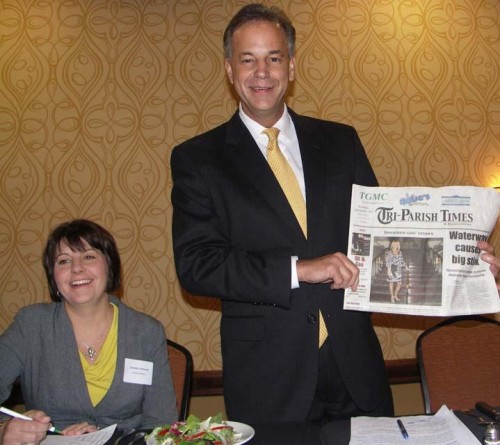Tuesday, Oct. 4
October 4, 2011Leanda Boudreaux Hebert
October 6, 2011Louisiana Department of Natural Resources Secretary Scott Angelle contends that changing with the times in spite of adversity keeps people and communities going. He added that the Tri-parish region stands as an example of making changes while standing firm to keep advancing over the years.
“This is not your grandfather’s Terrebonne Parish,” Angelle told members of the Houma-Terrebonne Chamber of Commerce during their membership meeting.
Angelle recalled June 2010, when the petroleum industry was faced with a government imposed offshore drilling moratorium. He realized during a meeting with regional business and government leaders at that time that they were not going to put up with the federal government shutting down their primary industry.
“It took 314 days to get the first [drilling permit following the moratorium],” he said, “but I give credit to folks of this area for saying, ‘We’ve adapted too many times in Terrebonne Parish and we are not taking this one lying down.'”
Angelle said that coastal restoration and hurricane protection have always been concerns for the region and prompted an attitude of adaptability that has been an example for other areas.
The DNR secretary said many changes to the region seen during the lifetimes of those present include the development of U.S. Highway 90, paved roads compared to shell-covered streets, an industrial airport at Houma’s one-time Army Air Corps dirigible base, expansion in medical care from the Ellender Memorial Hospital to Terrebonne General Medical Center and Leonard Chabert Medical Center, growth in the seafood industry with cold-shipping technology, emergence of the Houma Navigational Canal, and influences of the oil and gas industry.
Listing the presence of corporate and industrial headquarters in Terrebonne Parish, combined with coastal restoration and added economic concerns, Angelle said the region’s growth requires thinking differently than the common approaches of operation half a century ago.
Angelle listed three sets of circumstances to make his point. “Circumstance No. 1,” he said, “I would tell you is that we are the first generation of Americans … that really believes that clean water and clean air is an absolute right and not a luxury. None of us is going to be about having an environment that we are not going to be proud of. So we need to understand that we are that generation of Americans saying, from a public policy standpoint, that we demand from our leaders environmental laws that protect our water and our air and making sure we have green grass.”
A second circumstance voiced upon by Angelle, was his thought that many of those present represent the first generation of Americans that expanded beyond center-of-town settings to suburban living with climate controlled homes and workplaces. “We often live where we don’t work,” he said. “We are absolutely married to our automobiles in America and none of us is about to change that.”
A third circumstance Angelle mentioned, was that the current working generation of Americans is the first ever that is required to compete for fuel in a true global economy. “That change is here to stay,” he said.
Angelle said that things are getting better in the current economy, but there is still a long way to go. “It is never going to be the same,” he said. “The regulatory environment is going to be difficult, but I am confident that this area of Louisiana will adapt and we will see the resources of the Gulf of Mexico be some of the resources that can help change the energy policy in America.”
Angelle’s presentation was followed-up by comments from Lt. Gov. Jay Dardenne who commented on how the coastline of Louisiana has changed people and their approach to life.
“There are things that change our lives that take decades to happen and you experienced that here in Terrebonne [and] Lafourche parishes as we have sadly watched the loss of [coastal] land,” Dardenne said.
“I think [Angelle] hit the nail on the head,” Chamber President Drake Pothier said. “What a lot of people around here know for a long time is not only are we blessed with a lot of entrepreneurs but people who have learned to adapt. You see that after hurricanes and hopefully we will see that after an economic downturn that our business community and government officials are able to make the changes to come out better than whatever the disaster would be. We are certainly seeing that in our economy.”
“It is an important endeavor for us to be thinking in the future about how things should be,” Dardenne said. “We recognize that much damage has been done that cannot be repaired, but there is much damage … that can be addressed. The future of the coastline is going to dramatically impact all of us who call this great state home.”
Louisiana Department of Natural Resources Secretary Scott Angelle shows a reported example of how Terrebonne Parish business has adaptability when faced with challenges of economic impact. MIKE NIXON








